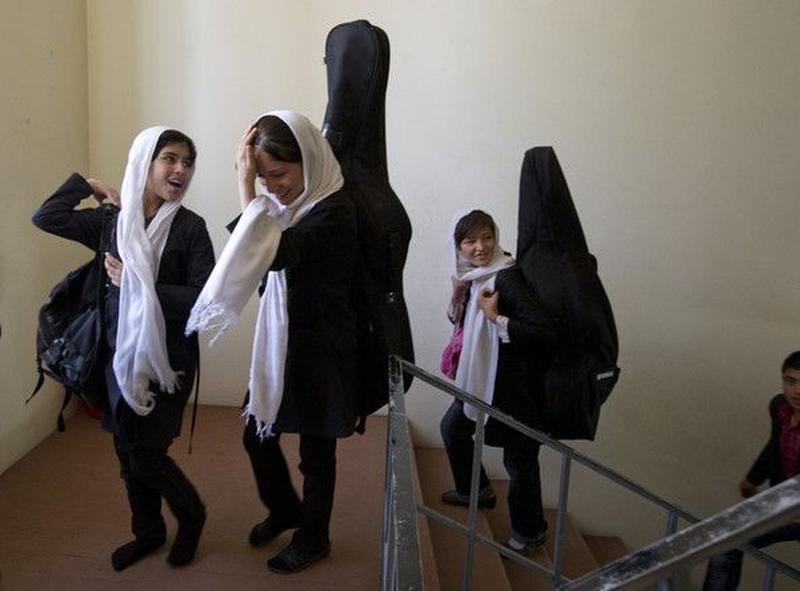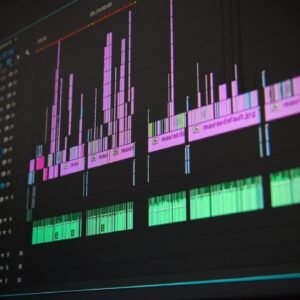Everyone loves music. It’s in our souls, our blood, and our bodies. Music is as essential as water and food. Some of us have vinyl, cassettes, cds, or pods of music. Regardless of the format we all enjoy the many different forms of art that is music. What you may not know is that a large portion of the world doesn’t get to listen to music freely; they aren’t able to choose the songs they want to hear. A popular piece of work at the moment is called “Anthem” and it was written by Australian singer songwriter John Farnham in 1987. Sadly this piece of art is forbidden in Afghanistan because it contains a few simple notes that were deemed too Western for society and law at the time.
In this article, I will talk about “Did The Taliban Ban Music”. Let’s start.
Cultural Rights And Ethnomusicology
The Taliban in Afghanistan banned music in 2001. The Taliban were an Islamic fundamentalist political movement that ruled Afghanistan from 1996 to 2001. The Taliban regime followed a strict interpretation of Islam, including the prohibition on all music and television.
In February 2001, the Taliban’s Ministry for the Promotion of Virtue and Suppression of Vice issued a decree banning all forms of music from radio stations, television channels and public entertainment venues. The decree was issued following a meeting between Mullah Omar, leader of the Taliban regime, and senior members of the religious establishment in Kandahar city. This meeting was convened to discuss concerns that some TV channels were promoting un-Islamic behaviour by showing Afghan women dancing on stage wearing tight fitting clothes instead of covering their bodies as ordered by Islamic traditions.
The ban resulted in complete suspension of music programmes on both state-owned Radio Television Afghanistan (RTA) as well as private TV channels such as Tolo TV and Lemar TV which were popular among Afghans because they broadcasted Hindi movies dubbed in Pashto language during prime time slots every day from 8pm to 9pm.
The Taliban’S Standpoint On Music
The Taliban’s standpoint on music is that it is un-Islamic and against the laws of Islam. Music is considered to be a sin in the religion of Islam, and those who engage in any form of musical entertainment are considered to be sinners.
Music was banned in Afghanistan by the Taliban government from 1996 until 2001, when they were forced from power following the September 11 terrorist attacks.
The Taliban’s standpoint on music can be described as a confusing mix of contradictory positions. On the one hand, they have banned all forms of music (including instruments) in public places, while on the other hand, they allow music to be played privately in homes and gatherings.
In September 2000, Mullah Omar issued an order banning all forms of music in Afghanistan. He stated that this was being done because music was un-Islamic and against the teachings of Islam. According to him, it was only permissible if it did not lead to dancing and singing. He further said:
It is strictly prohibited for anyone to sing or dance in any public place or private gathering without permission from the religious authorities or without being in their presence (i.e. at wedding parties). Anyone who violates this rule will be severely punished.

The Impact On Musicians And Music
The Taliban banned music in Afghanistan in the 1990s. The prohibition was part of its campaign to impose strict Islamic law on the country.
The ban left musicians and music lovers with no choice but to go underground.
Music was allowed again after the Taliban were removed from power in late 2001, but it has not fully recovered from the damage done during their five-year rule.
The Taliban also banned any kind of art that did not conform to their view of Islam. This included dancing, photography and television. In some cases artists were executed for their work.
The Taliban’s ban on music was enforced through beatings, torture and death. The group’s hard-line interpretation of Islam forbids all forms of entertainment including music and television.
The Taliban imposed its ban on music in 1994, two years after it took control of the country following a civil war with rival factions.
In 2001, when the United States invaded Afghanistan to topple the Taliban regime, musicians celebrated by playing music publicly for the first time in many years.
However, since then there have been reports that some musicians have been harassed by ultra-conservative Islamic clerics who object to their work. In September 2010, singer Ahmadzai Seddiqi was arrested in Kabul for allegedly insulting Islam by performing at an event hosted by the U.S.-led coalition forces.

The Music Ban Permeates Outside Afghanistan
The Music Ban Permeates Outside Afghanistan
In July, a group of young Afghans gathered in Kabul to celebrate the return of music to their country. They were joined by members of the international media and diplomats who had been invited to the event. The evening was filled with music and dancing, but it also served as an opportunity for the young artists to perform for an audience that would not be familiar with Afghan culture or traditions.
The event was organized by the United Nations Development Programme (UNDP), which has been working with local musicians and radio stations since 2002 to foster a national music industry in Afghanistan. The UNDP has helped establish more than 50 radio stations throughout Afghanistan, which broadcast both traditional Afghan music as well as other genres from around the world.
In Afghanistan, where the Taliban bans music, women and girls often listen to music in secret.
The Music Ban Permeates Outside Afghanistan
Outside of Afghanistan, the Taliban has also banned music in Pakistan and other parts of Central Asia. The Taliban’s influence is strongest in Pashtun-dominated areas in both countries. The Pashtuns are the largest ethnic group in both countries and speak a language that is mutually intelligible across the border.
“There is no doubt that this ban will have an impact on people who have different cultural backgrounds,” says Ahmad Shah Mahmoudi, a member of parliament from Herat province in western Afghanistan. “In many parts of Afghanistan, there are people who listen to music.”
As a result, he says, many people will continue listening to music but do so quietly out of fear of being discovered by neighbors or relatives who support the Taliban’s ban on music.
FAQs for Did The Taliban Ban Music
Now that you understand “Did The Taliban Ban Music”, let’s move on to the FAQ section.
Does The Taliban Still Ban Music?
Does The Taliban Still Ban Music?
The Taliban banned music in Afghanistan in 1996. Music has a long history of being linked to rebellion and political protest. In the early 1990s, the Taliban leader Mullah Omar imposed a strict interpretation of Islamic law that included banning music.
Mullah Omar said that all music — including singing, listening to music and playing musical instruments — was un-Islamic because it was “the work of the devil.” At the time, he said: “Songs are like drugs for people.”
In some areas of Afghanistan, such as Helmand Province and Kabul, these restrictions were enforced by public beatings or death sentences for those who violated them. However, these prohibitions did not apply to everyone at all times. It depended on who was enforcing them and where they were enforcing them.
The Taliban’s ban on music was a religious decree, issued in 2001 and not rescinded. However, the Taliban have not been active in Afghanistan since 2001. The country has been trying to rebuild itself since then, and has faced many challenges — including fighting against the Taliban.
The Taliban have made some efforts over the years to open up about their religious views. In 2012, they held a symposium on Islamic law where they discussed whether it was permissible to listen to music or not. The scholars who attended concluded that it was permissible if done in moderation and with respect for others’ feelings.
The Taliban’s ban on music is still in effect today, but it’s hard to enforce such a ban in a country like Afghanistan where most people are illiterate and don’t understand the ruling anyway.
What Did The Taliban Ban?
What Did The Taliban Ban?
The Taliban banned music, television and cinema in Afghanistan. They also prohibited women from working outside the home or attending school.
They issued a list of other restrictions:
Boys and girls could not attend school together.
Women were not allowed to work outside the home.
Men were forbidden to shave their beards or wear gold watches or rings.
All forms of entertainment were forbidden, including kite flying and soccer (though some argue that the Taliban actually encouraged soccer).
The Taliban banned music, but not all music. They did not ban all forms of music, but only those that were “un-Islamic.” The Taliban also banned things like television and photography.
The Taliban did not ban all forms of music, but only those that were “un-Islamic.” For example, they allowed singing in praise of Allah and the Prophet Mohammad, as well as the recitation of religious verses and prayers. They even allowed instrumental versions of these songs. However, they banned any other type of music because it was considered to be un-Islamic.
Why Does The Taliban Restrict Music?
Why Does The Taliban Restrict Music?
The Taliban has banned music in Afghanistan since 1996, when it came to power. To keep the Taliban in power, they have used the “law of Allah” as a way to control their people.
Music is not allowed in the Quran, which is why many people believe that the Taliban bans music. However, there are no direct references to music in the Quran. The only reference we can find is in Chapter 17 verse 22 where we read: “And We have made unlawful for them [forbidden] what is dead [even] after its death and blood and flesh of swine and that on which any other name than that of Allah has been invoked.”
So while music may be considered haram (forbidden) in some interpretations of Islam, it is not clear why this should apply to all Muslims, let alone all Afghans. In fact, many Muslim cultures around the world have thrived on music for centuries – from Arabic classical music to Turkish dervish chanting. There are also many verses in the Qur’an that celebrate love and joy along with obedience to God’s will.
Is Music Illegal In Afghanistan?
The Taliban’s ban on music is well known, but what about the current situation? Is music illegal in Afghanistan?
Music is a great source of entertainment for people all over the world. But in some countries, it’s outlawed or restricted. In Afghanistan, music was banned by the Taliban regime until 2001.
The Taliban leaders banned most forms of public entertainment — including music and sports — as un-Islamic. They also prohibited women from working outside the home and girls from attending school. The ban made Afghanistan one of the most oppressive places on earth for women and girls.
But after the September 11 attacks, U.S.-led forces overthrew the Taliban government and restored an interim government that allowed freedom of expression — including freedom to listen to music and watch films again.
This is a question that comes up often and it’s not so simple. The Taliban, the Islamic fundamentalist group that ruled Afghanistan from 1996 to 2001, banned music during its rule. But the Taliban were ousted in 2001, and today there is no blanket law against music in Afghanistan.
However, some parts of Afghanistan remain under Taliban control, including areas in southern Helmand province and northern Kunduz province. In these places, it’s unclear whether music is legal or not. The Taliban has outlawed many aspects of social life, including education for women and girls and television and other media outlets.
Is Music Against Islam?
The Taliban have banned music in Afghanistan. Music is a form of entertainment that is enjoyed by people all over the world. It has a soothing effect on the mind and helps to calm people down when they are angry or upset. Music is one of the most effective ways to make people feel relaxed and happy, but this was not the case in Afghanistan during the Taliban rule.
The Taliban government prohibited music from being played or listened to in public places such as shops, restaurants and schools. They also banned musical instruments from being sold in shops and destroyed any musical instruments that they found in peoples’ homes.
The Taliban regime believed that music was against Islam because it was considered to be an un-Islamic practice. They justified their decision by saying that all forms of entertainment are against Islamic principles because it distracts people from their religious duties towards Allah (God).
Is Playing Music Haram In Islam?
Is Playing Music Haram In Islam?
The answer to this question is yes.
The Quran says:
“We have made some acts of worship mandatory for them, while others are recommended.” [Al-Quran 2:177]
Playing music is not obligatory upon Muslims, so it is recommended that they should avoid it. One of the reasons for this is because it leads to fitnah (temptations) and distracts people from worshiping Allah alone without partners.
The Taliban banned music in Afghanistan. The Taliban are a militant Islamic fundamentalist political movement in Afghanistan. Its leaders have been sheltered by Pakistan’s intelligence agency ISI.
The Taliban have banned most forms of entertainment, including television, cinema, music and kite-flying. In September 2001, the Taliban ordered all videocassettes and videodiscs to be destroyed; this included feature films as well as domestic recordings of news broadcasts featuring images of living creatures or humans. By doing so they wanted to destroy any evidence of their crimes against humanity and their brutal way of life.
The Taliban’s ban on music was not just limited to singing and playing instruments but even listening to music was forbidden under Sharia law.
In early 2001 the Taliban issued an edict prohibiting music and dancing at weddings, divorces and other such celebrations saying that such activities were a form of “obscenity” and “un-Islamic behaviour” which were against the teachings of Islam.
Conclusion for Did The Taliban Ban Music
The Taliban destroyed a number of the spherical clay containers, but it’s hard to tell if this was due to religious objections or if they just didn’t know what they were. In any case, we know that the people of Dilberzak knew how to make these instruments and lived in an otherwise relatively affluent (from what can be gleaned from the site) community. It is certain that the music they played was a far cry from what we are used to today. But whether or not music was part of daily life, it remained a part of every celebration in their home–and festivals were a big deal: hundreds would gather to dance and drink as one band of musicians played through the night while another took over in the morning—as much as eight hours at a time!
Thank you for reading, and I hope you get the point of “Did The Taliban Ban Music”. If not, please contact me or leave a comment below. I would be pleased to help in any way I can.





